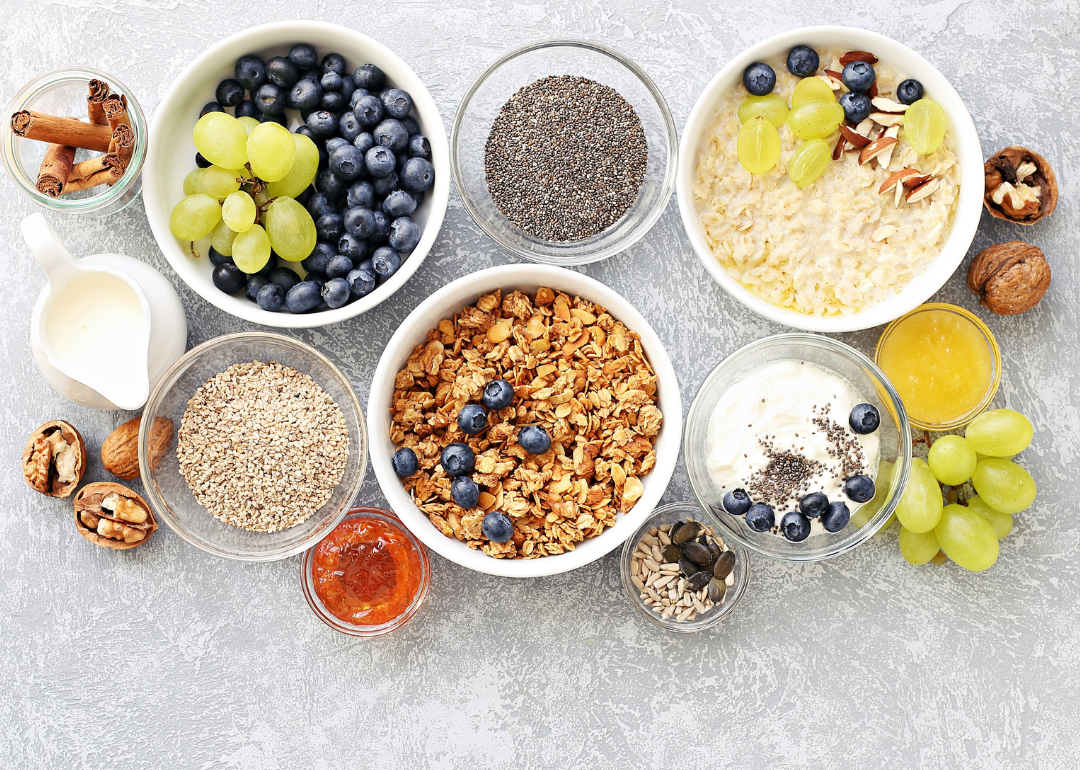
This story originally appeared on Stacker and was produced and distributed in partnership with Stacker Studio.
10 benefits of a plant-based diet
There are roughly 9.7 million vegans in the United States today, up a staggering 3,000% from 2004, according to a 2020 study from Ipsos Retail Performance. These dietary changes have caught the attention of businesses and created a booming vegan market where even traditional meat industry giants have gotten into the faux meat game.
Sales of plant-based food in 2020 grew by 27%—twice as fast as food sales in general, according to data from SPINS for The Good Food Institute and Plant Based Foods Association. A full 57% of Americans say they buy plant-based alternatives to animal products.
People’s reasons for adopting a plant-based diet range from personal health to animal rights to environmental concerns related to factory farming. Thistle analyzed numerous academic studies published in peer-reviewed journals such as Frontiers in Nutrition and Nutrients to curate a list of 10 benefits of a plant-based diet.
Plant-based diets inherently focus on whole grains, beans, fresh produce, seeds, and nuts, but not everyone who eats plant-based diets eschews animal products entirely. As with all diets, it’s important to consider a person’s genetics, activity level, preexisting medical conditions, and any nutritional deficiencies or food allergies. In particular, those adopting plant-based diets are wise to make sure they’re getting sufficient levels of vitamins and minerals, from B12 to omega-3 fatty acids.
Keep reading to discover 10 benefits of plant-based diets.

Reduced inflammation
Inflammation is caused by white blood cells fighting off invaders—whether foreign objects, such as a splinter; irritations, such as allergies; or pathogens, such as bacterial or viral infections. In the case of autoimmune diseases, the immune system attacks healthy, normal tissue in the body. Overactive inflammatory response is widely considered by experts to contribute to chronic disorders including Type 2 diabetes or heart problems.
Acute, or short-term inflammation, comes on as localized pain, redness, loss of mobility, or swelling. The area may be hot to the touch, as in the case of a bee sting, and can last from a few hours to several days. Chronic inflammation can last months or years, and can come on as a hyper reaction to an external trigger, such as is the case with allergies; a mistaken reaction in which the immune system attacks healthy tissue, as with cancer or eczema; or long-term exposure to an irritant.
Diet and exercise have major effects on inflammation: Whereas obesity, smoking, lack of consistent sleep, and a diet heavy in added sugars and unhealthy fats can all increase inflammation in the body, nutrients found in fruits and vegetables have been shown to reduce inflammation.

Reduced carbon footprint
A popularly cited 2018 analysis of the international food industry suggests that switching to a plant-based diet represents the largest single action a person can take to reduce their environmental impact. While those stats—such as the fact that the ecological footprint of livestock represents 18% of calories and 83% of farmland—are striking, they don’t take into consideration all the complexities of sustainable eating habits.
It is true that pound for pound, animal protein requires 100 times as much water as grain protein—and that the production of oat milk emits 80% fewer greenhouse gases and requires 60% less energy than cow’s milk. Still, switching to a plant-based diet doesn’t guarantee more eco-friendly food choices: Growing practices, treatment of workers, the distance food travels, packaging, and ingredient sourcing all contribute to how sustainable the food on your plate is—or isn’t.

Lower risk of Type 2 diabetes and improved kidney function
Consumption of red meat and poultry has been linked to an increased risk of diabetes, in part because of the high volume of heme iron in those meats, according to findings in the Singapore Chinese Health Study published in 2017.
That research involved recruiting more than 63,000 adults between 45 and 74 from 1993 to 1998, and following their health progress for 11 years, in addition to studying the correlation between various kinds of meats and the volume of heme iron in each. Participants who consumed the highest levels of red meat and poultry showed a 23% and 15% increase in diabetes risk, respectively. Consuming fish and shellfish showed no perceptible association with diabetes risk.
Meanwhile, plant-based diets have been shown to not only protect Type 2 diabetics from developing kidney disease, but to help reverse Type 2 diabetes itself. Plant-based diets may also reduce mortality rates in individuals with chronic kidney disease.

Reduced risk of heart disease
Whole plant-based foods contain plenty of fiber, zero dietary cholesterol, and low amounts of saturated fats—a winning combination for heart health. Meanwhile, meat, cheese, and eggs come with cholesterol and saturated fats that, in excess, may create plaque buildup in a person’s arteries.
But it’s not enough to just avoid meat: For heart health on a plant-based diet, it’s important to steer away from processed foods, including white rice and white bread, which lack nutritional value and contain a high glycemic index. This increases your odds for spiking blood-sugar levels and increased appetite. Similarly, whole fruits are healthier than fruit juice, even 100% juice, which often loses nutrients and vitamins while being processed and contains high levels of sugar.

Low levels of ‘bad’ cholesterol
Numerous studies have shown the positive effects of plant-based diets—particularly a vegetarian or vegan diet combined with nuts, soy, and fiber—on cholesterol levels. Five observational studies, cited in a study published in 2009 in the American Journal of Cardiology, found lower blood concentrations of TC and LDL cholesterol in populations consuming plant-based diets.

Reduced risk of cognitive impairment and dementia
A direct correlation was found between high intakes of fruit and vegetables and a significantly reduced risk of cognitive impairment and dementia, according to a report published in Frontiers in Aging Neuroscience in 2017. The key is likely in nutrients abundant in plant-based diets, including antioxidants, vitamins, and folate, that have been shown to have significant cognitive benefits.

Improved gut health
Vegetarian and vegan diets have been shown to promote a healthy mix of beneficial bacteria promoting gut and overall health. A healthy gut biome promotes a high-functioning metabolism, strong immune system, healthy bowel movements, and appropriate levels of hormones that contribute to adequate appetite regulation.
Just 16 weeks of a healthy vegan diet focused on whole fruits and vegetables has been shown to cause a documented improvement in gut health, according to research led by Hana Kahleova, M.D., Ph.D., of the Physicians Committee for Responsible Medicine and presented in 2019 at the European Association for the Study of Diabetes in Barcelona.

Reduced risk of certain cancers
Plants create an abundance of phytochemicals that help to protect cellular damage as well as being anti-inflammatory. A variety of long-term studies suggest that benefits like these from eating whole plant foods, as opposed to processed foods, may actually be able to prevent up to a third of all cancer cases. Most-studied have been plant-based diets’ capacity to help protect against breast, colorectal, gastrointestinal, and prostate cancers.

Improved athletic performance
A growing number of professional athletes have turned to a whole-foods, plant-based diet to reach optimal performance. Colin Kaepernick, Venus Williams, United States soccer star Alex Morgan, professional surfer Tia Blanco, WNBA player and four-time Olympic gold medalist Diana Taurasi, and dozens more pros are all vegan.
Like the rest of us, dietary choices of athletes come with, at times, complex reasoning behind them. But there’s a lot of science backing up whole plants as a great choice for athleticism: Heart-healthy foods, such as whole fruits, vegetables, legumes, and nuts, are also largely plant-based. The anti-inflammatory principles and immune support of plants also benefit athletes in major ways. Tennis pro Venus Williams transitioned to a plant-based diet after being diagnosed with an autoimmune disease called Sjögren’s syndrome and said a vegan diet allowed her to manage the disease without prescription medications.

Reduced arthritis pain
Low-fat, high-fiber diets are proven to reduce inflammation, which is great news for those following a whole-foods, plant-based diet. Because of how effective plants are at reducing inflammation, plant-based diets have been shown to work wonders for those living with inflammatory types of arthritis.
In a 2015 study, published in Arthritis, researchers investigated the effect of a plant-based diet on osteoarthritis. Those adhering to a whole-foods, plant-based diet experienced significant drops in pain levels and jumps in motor function in just two weeks.
This story was produced and distributed in partnership with Stacker Studio.



